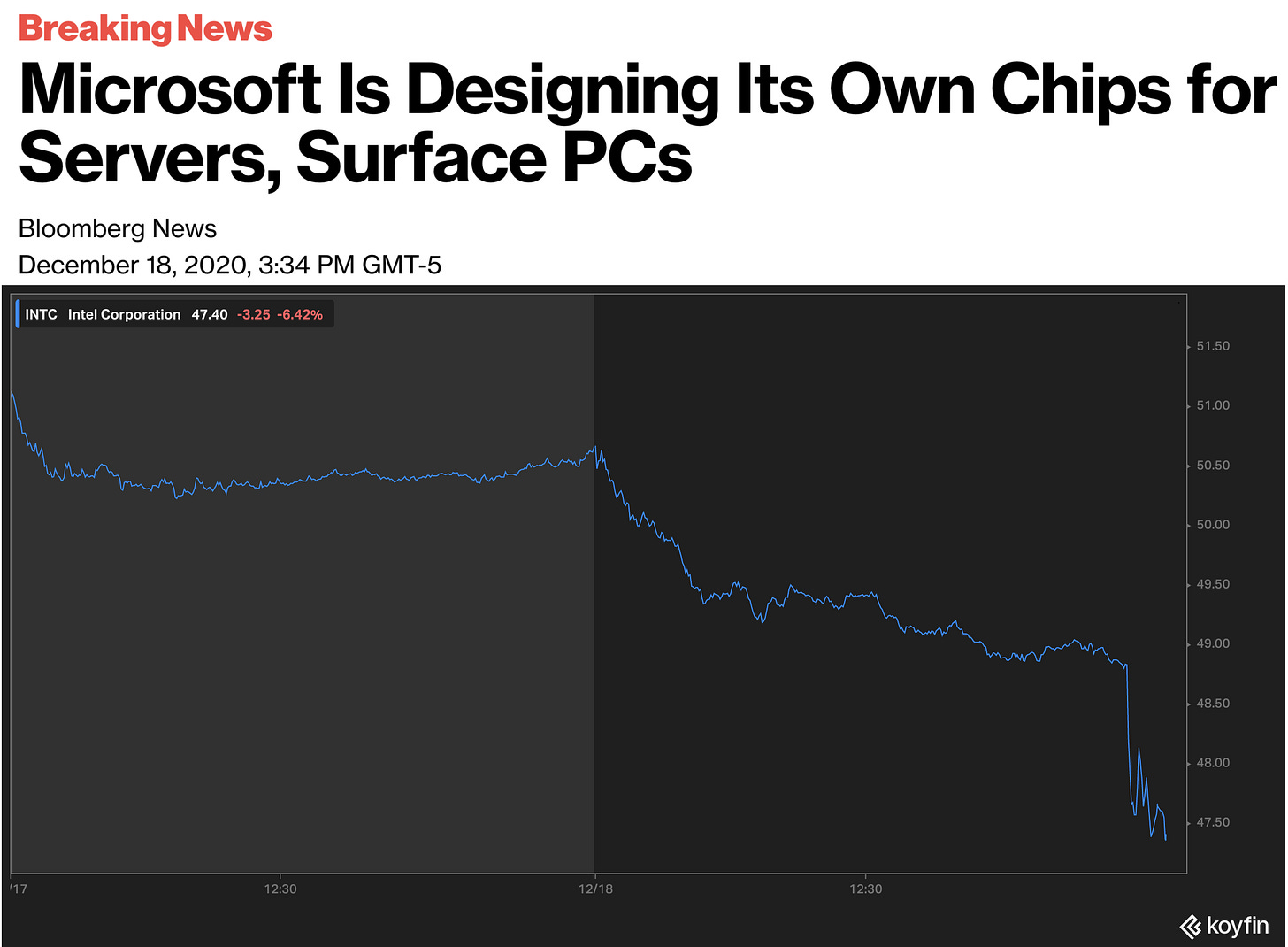67: Microsoft's ARM Chips, Constellation's Spin Out, TSMC for Food, Jack Ma's Ant Problem, Shopify's Lütke, China & Semiconductors, Cyberpunk'ed, and Mandalorian
"They are literally mindless."
“There it was, inconceivably, K. Goedel, listed just like any other name in the bright orange Princeton community phonebook,” writes Goldstein, who came to Princeton University as a graduate student of philosophy in the early nineteen-seventies. (It’s the setting of her novel “The Mind-Body Problem.”)
“It was like opening up the local phonebook and finding B. Spinoza or I. Newton.” Although Gödel was still little known in the world at large, he had a godlike status among the cognoscenti.
“I once found the philosopher Richard Rorty standing in a bit of a daze in Davidson’s food market,” Goldstein writes. “He told me in hushed tones that he’d just seen Gödel in the frozen food aisle.”
—Time Bandits, New Yorker, 2005.
👩🚒 Random PSA: I bought a fire blanket (and one for my parents). I didn’t know they existed until I saw a Twitter ad*, and after looking them up, they make all the sense in the world. Extremely asymmetric proposition — a few dollars to maybe reduce damage from a fire or possibly save your house and/or the lives of loved ones. Another no brainer.
We already have fire extinguishers on every floor, but having a blanket made of flame-retardant fiberglass on hand provides another option and could be extremely useful to put out small kitchen fires (without the mess that a chemical extinguisher would make), and in the worst case scenario, to wrap yourself & loved ones in as you make a run for it (hoping it never gets to that, but every person who had to do that probably also hoped the same, so you never know).
*I found the same model cheaper on Amazon than on the site that paid for the ad (sorry ¯\_(ツ)_/¯), here’s the one I got in Canada, and here’s an equivalent one in the US.
🏎 We got Mario Kart 8 Deluxe for the 6yo to have a new game to play during the lockdown-holidays. It seems very well-made, and he’s having lots of fun so far.
Clever thing I noticed: At the 150cc engine class, there’s the option to replay the circuits, but mirrored. So basically, your muscle memory is worthless because every right turn is now a left turn and vice-versa.
Great way to get more out of the assets that they had built, as I expect this mirroring is fairly trivial to implement in software, and doesn’t require too much extra work or storage. Kudos to whoever had that idea at Nintendo (or was it copied from another racing game? I can’t say I know the genre well…).
Investing & Business
Microsoft Corp. is working on in-house processor designs for use in server computers that run the company’s cloud services, adding to an industrywide effort to reduce reliance on Intel Corp.’s chip technology, Bloomberg News reports.
The world’s largest software maker is using Arm Ltd. designs to produce a processor that will be used in its data centers, according to people familiar with the plans. It’s also exploring using another chip that would power some of its Surface line of personal computers. (Source)
Curious if it’ll be based on the new Snapdragon 888 cores or if they’re going more custom than that.
Not surprising, and probably part of the project that led to the release of x86-64 emulation/translation on the latest dev build of Windows for ARM, as I wrote about in edition #64.
Constellation Software’s Topicus Acquisition & TSS Spin Back on Calendar
After a hiatus for unknown reasons, we’re back to our regular programs:
Constellation Software, acting through its TSS operating group and its subsidiary TPCS Holding B.V., entered into a binding agreement with IJssel B.V. to purchase 100% of the shares of Topicus.com B.V., a Netherlands-based diversified vertical market software provider. In connection with the anticipated closing of the acquisition and the subsequent public listing of the subordinate voting shares of Topicus.com Inc., TSS will be spun out of Constellation and will operate together with Topicus as a separate publicly traded company.
Constellation also announced today that it has resolved to pay a special dividend pursuant to which all common shareholders of record on December 28, 2020 will be entitled to receive, by way of a dividend-in-kind, 1.859817814 subordinate voting shares of Topicus.com Inc. for each common share of Constellation held. The payment date for the Dividend is expected to be on or about January 4, 2021. [...]
The Spin-Out Shares have been conditionally approved for listing on the TSX Venture Exchange, subject to Topicus.com Inc. fulfilling all of the listing requirements. Trading of the Spin-Out Shares [...] is expected to begin approximately 30 days following completion of the acquisition of Topicus. (Source)
I wrote about the Topicus acquisition & TSS spin in edition #29. I don’t have much to add since, well, we haven’t really learned much about it since…
Interview: Tobi Lütke, Shopify Founder & CEO
Sriram Krishnan at The Observer Effect (good name) has a fairly long interview with Tobi Lütke. Some highlights:
I think a lot about where to devote my attention. In this way, there is no typical day.
My attention is the most liquid and valuable resource that I have. [...]
That said, usually I have themes. For instance, I have a priority list, and I have decision logs that chronicle all the things I am trying to figure out.
These cover different questions. For example, if I had just taken the company over, how would I change it? How would I build a company to potentially disrupt Shopify? I try to make my calendar match these bigger topics and other urgent priorities. In a way, the calendar is nothing more than a strategy.
At one point, I started complaining about blue weeks [in my calendar] where every single time slot was taken. And someone said, “Well, if you don't like blue, I can make any color.” And I replied, “Well, how about we color based on leverage?” And that’s just what we did.
Gotta love how he reflexively tries to look at a better way to do things. If you’re going to color-code your calendar, why don’t you use colors that also help us make better decisions and better use our time? Simple, but powerful. I love it.
I have to think about how I could incorporate something like this in my life — I’m sure the idea of creating a system where the path of least resistance it reinforcing the highest-value activities, when it comes to my own goals, can be useful, even if not implemented in the same way).
I started a company because I love learning. I went into programming because I found it fascinating. During meetings, I just love to hear the things that teams have discovered. When you're discussing an idea or a decision, I want to know what has been considered. To be honest, I find myself more interested in the inputs of an idea than the actual decision. I say this because when I have my own ideas, the first thing I tend to do is just try to falsify them, to figure out why what I'm thinking about is probably incorrect. This is actually something that I have to explain to people that I work with. If I like someone's idea, I tend to do the same thing: I try to poke holes in it. [...]
The decision being discussed could be the perfect decision according to the various assumptions that everyone came into the room with. But if those assumptions are faulty, the seemingly perfect decision is faulty too. Interestingly, assumptions are rarely mentioned in the briefing docs or in the slide deck. Usually, I'm trying to make sure those are rock solid.
So much here, so much. But at the root of it is curiosity, and the scientific mindset.
As time goes on, I’m finding more and more that my “tribe”, the people I have most fun and am most simpatico with are people with an over-developed sense of curiosity.
I do like range. I find that the first 80% of every field is pretty quick to learn—it’s equivalent to the Pareto principle—and I think that creativity generally is people using lessons from one field in another field in different ways. Because of this, I find learning fascinating.
I come from an engineering perspective. One of my biggest beefs with engineers, in general, is that they love determinism. I think there's very little determinism in engineering left that's of value. An individual computer is deterministic; once you introduce even just a network connection into the mix, everything becomes unpredictable and you have to write code that's resilient to the unknown. Most interesting things come from non-deterministic behaviors. People have a love for the predictable, but there is value in being able to build systems that can absorb whatever is being thrown at them and still have good outcomes.
[Learning] is really my core value. I believe that the job we all have in life is to acquire knowledge and wisdom and then share it. I just don’t know what else there is. This is the bedrock of my belief system.
When I get close to any field, I think about how far I want to go. I'm probably further along with programming. I don’t know if I want to get from 90 to 91% in programming when, with the same amount of work, I could figure out the first 60 to 70% of UX or even something like drawing.
This is a really interesting way to put it. I’ve thought about things in this way for a while, but never had a concise way to explain it to people, and it always probably sounded to them like I was just giving up on that particularly pursuit.
He then talks about Jazz, Starcraft, trust batteries and a bunch of other interesting stuff, but I’ll stop here. You should probably read the whole thing.
Jack Ma to CCP: Take Whatever You Want
As Jack Ma was trying to salvage his relationship with Beijing in early November, the beleaguered Chinese billionaire offered to hand over parts of his financial-technology giant, Ant Group, to the Chinese government [...]
“You can take any of the platforms Ant has, as long as the country needs it,” Mr. Ma, China’s richest man, proposed at an unusual sit-down with regulators, the people said. [...]
Sounds like someone trying to bribe officials with part of their fortune to be allowed to keep the rest. When you’re in that position, the officials clearly know they can just take it all whenever they want, and the fortune is not really yours…
If you live somewhere with a strong rule of law, don’t take it for granted and work hard to protect it.
Mr. Ma had angered Beijing by lashing out in a speech in October at President Xi Jinping’s signature campaign to control financial risks, saying it stifled innovation. Now, the regulators had called the meeting to voice their concerns about Ant’s business model.
His olive-branch offer at the meeting failed at saving the IPO and Beijing has since stepped up efforts to rein in China’s Big Tech giants.
“Don’t you dare say that we’re stifling innovation! To punish you, we’ll demonstrate exactly what you were talking about…” ¯\_(ツ)_/¯
Interview: Alex Danco (Shopify)
Good interview by Jim O’Shaughnessy:
Wide-ranging conversation on Shopify, e-commerce (eBay, Amazon), the power of twitter, academia's broken funnel, the lessons of pro-wresting for start-up founders/can founders lie?, Chamath's reality distortion field, how SPACs may evolved as a mechanism, and more.
The TSMC of Food? Restaurant APIs?
Not something I’ve been following much (probably best to ask someone like Post Market if you want to know more), but the metaphors of this emerging model are very intriguing to me.
MrBeast, a Youtuber with 48m followers that I had never heard of, launched his “300 restaurants” across the US at the press of a button. He made a video to promote the idea where they operate a real restaurant and give away money, iPads, a car, and such, and it has 19m views in a day. He made an app, and it reached #1 in the App Store. Whatever the promotion stunts cost, it’s still nothing compared to a traditional marketing campaign…
To be clear, what intrigues me is the nascent model, not this specific brand or the products (that some are reporting are not exactly great).
Third-party contracting of the actual product, and focusing on product/customer acquisition/branding. Kind of like the whole chip designer + TSMC, or software product designer + 3P APIs to build on. Also, not an industry I follow, but it seems like this has been happening in cosmetics.
If you already have a huge audience — and in the internet age, there are plenty of influencers with millions of fans and basically zero CAC — using ghost kitchens to make food that is then delivered via Uber Eats or DoorDash allows to monetize your audience in a way that wasn’t possible not long ago. Will this eventually be added to the classics (selling t-shirts and stickers and mugs)?
And while the execution of the idea may be at the Geocities phase today, it’s thinking about what this could become in the future that is exciting.
What happens if a few years when someone with great attention to detail and the ability to execute like Danny Meyer or Nick Kokonas partners up with high-quality, iterated ghost kitchens that can take a detailed blueprint and deliver it to a high level of quality (with a bunch of people going around tasting stuff for final QA)?
In a few years, the big restaurant chains could one day wake up and have a new nationwide high-quality delivery competitor pop up almost overnight. Fun to think about…
State of China’s State Semiconductor Push (State State State)
Xi has made clear that creating a self-reliant semiconductor ecosystem free from foreign dependencies is one of his top policy priorities. In spite of the reported $1.4tn in state money committed to pursuing that aim, of late some major Chinese companies have hit serious stumbling blocks. For instance, the C-suite of SMIC, China’s most advanced domestic fabrication firm, is in turmoil while the Tsinghua Unigroup tech conglomerate is likely to default on $2.5bn in foreign bonds.
Tsinghua Unigroup wasted decades of Chinese government funds and talent underdelivering in its chip divisions and running its acquisitions, which have frequently comprised some of the most promising Chinese chip firms, into the ground [...]
In the near term, that money will likely go to building more fabs which will increase China’s global stranglehold on the bottom of the semiconductor value chain like fabrication of larger nm chips and older packaging technologies. All the money in the world, however, can’t buy quick fixes for the two biggest Chinese vulnerabilities which the US is using to put the squeeze on Huawei’s HiSilicon and TSMC. China’s reliance on American Instruction Set Architectures (Intel’s x86, Arm) and foreign electronic design automation (Synopsis, Cadence, Siemens) will hamper the industry for years and years to come.
You can read the whole thing here.
Good Publicity for Crowdstrike
SolarWinds rolled out CrowdStrike’s Falcon Endpoint Protection across the endpoints on its systems to ensure that its internal systems are secure following the massive cyberattack. (Source)
Security researcher Vinoth Kumar told Reuters that, last year, he alerted the company that anyone could access SolarWinds’ update server by using the password “solarwinds123” (Source)
🤦♂️
Interview: Packy McCormick
Always good to get a strong Irish name on here that isn’t O’Shaugnessy, because it feels a bit Groundhog Day sometimes to keep recommending stuff by Patrick and Jim — but they keep making good stuff, so I don’t have a choice ¯\_(ツ)_/¯
Anyway, Packy spoke with Brandon Beylo, and it met my expectations: It’s good stuff!
This is going to sound corny, but you know what I like about Packy? He has a smile in his voice, and finds all this stuff endlessly fascinating and interesting, and that’s the lens that I’m trying to have. Life’s too short to be bored by what you do all day (and even if it was much longer, as I hope it becomes, it still wouldn’t be a good idea).
Science & Technology
Cyberpunk’ed, pt.2
Interesting thread on Twitter that claim that Cyberpunk 2077, one of the most anticipated game ever that has been in development for around 8 years, is not only buggy, but actually has a bunch of inexplicably missing features.
Here’s Gareth Damian Martin, who posted a few videos that show what he’s talking about:
Take the games traffic. No one apart from the player can drive a bike. Why? Well after a little testing it becomes obvious that drivers have no AI to speak of. They cannot navigate around an obstacle and often will freeze in the face of an obstacle. They are literally mindless.
Surely this leads to constant gridlock? Well no, because explicitly aware of this CDPR have made every stopped car disappear if you look away. Really. That way the card keep following their paths and any blockages are cleared up. This is NOT a bug.
This is a feature. This is a specifically engineered solution to a massive gap in the game’s feature set. And it turns out pedestrians behave the same way. Fire a gun in a crowded street everyone ducks. Turn 360. The game will unload every cowering pedestrian. This is insane.
h/t Matt Ball
Meander Maps of the Mississippi River (1944)
I really like the design of these books (I haven’t read them, so can’t vouch for the content, but that part seems good too).
The artwork is based on maps that Harold Fisk made of the Mississippi’s path over the ages (and in this context, represents the saying by Alfred Korzybski: “the map is not the territory”):
These eye-catching maps, drawn by Harold Fisk — a geologist and cartographer working for the US Army Corps of Engineers — trace the ever-shifting banks of the Mississippi River from southern Illinois to southern Louisiana. [...]
Technically speaking, all of these maps represent the lower Mississippi’s “meander belt” — the area of a valley bottom across which the river’s channel has shifted over the millennia. The meander belt of the Mississippi — which has the third largest watershed in the world — is immense. To represent all the water’s many shifts within this belt, Fisk hit on the brilliant idea of using overlapping colors.
You can see a lot more here:
h/t Scott Snelling
The Arts & History
That Time When ‘Men on Horseback [Almost] Captured a Fleet of Ships’
The Battle of Texel remains the only instance in history where a cavalry troop — horse-riding soldiers — [almost] captured a fleet of ships. It happened on this day in 1795, though it wasn't exactly a battle.
The winter of 1794-1795 was extremely cold in Holland, and when a storm rolled in, a Dutch fleet anchored in the strait of Marsdiep tried to shelter by Texel Island until the storm blew over, but then found themselves iced in [...]
News of the stuck ships reached French general Jean-Charles Pichegru, who told Johan Williem de Winter, a Dutch admiral who worked for the French, to deal with it. De Winter sent out infantry, calvary and horse-artillery [...]
around midnight, news arrived that the revolutionaries had taken over the government and wanted to pause the fighting. “But for this timely ceasefire there might have been an epochal fight between a land army and a fleet,” he writes.
“Five days later, the Dutch crews swore an oath to comply with French orders and maintain naval discipline, but were allowed to remain under the Dutch flag”
Mandolarian
I still haven’t given that show a try.
My desire for more Star Wars has been running pretty low because of the mediocre recent films.
I enjoyed large parts of Force Awakens, the first section captured the right feel, and I thought the chemistry between the young actors was good. But a large part of Last Jedi was prequel-level terrible, and it had all the characters split-up (goodbye chemistry). I stopped watching Rise of Skywalker 20-minutes in (I may give it another go someday).
Rogue One was also very uneven, but at least had some impressive space-battle CGI and that badass Vader scene. I haven’t bothered with Solo.
Maybe Mandalorian is the thing that will pull me back in…
Update: The day after writing the above, I started episode 1. I haven’t finished it, so no opinion yet, but I’ll share what I think when I’ve seen more.







